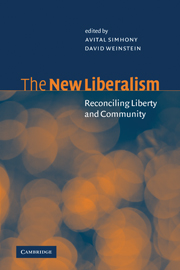Book contents
- Frontmatter
- Contents
- List of contributors
- Acknowledgments
- Introduction: The new liberalism and the liberal–communitarian debate
- 1 Liberal community: an essay in retrieval
- 2 T. H. Green on individual rights and the common good
- 3 T. H. Green's complex common good: between liberalism and communitarianism
- 4 Private property, liberal subjects, and the state
- 5 Neutrality, perfectionism, and the new liberal conception of the state
- 6 Bosanquet's communitarian defense of economic individualism: a lesson in the complexities of political theory
- 7 The new liberalism and the rejection of utilitarianism
- 8 Staunchly modern, non-bourgeois liberalism
- 9 The new liberalism and citizenship
- Select bibliography
- Index
2 - T. H. Green on individual rights and the common good
Published online by Cambridge University Press: 06 July 2010
- Frontmatter
- Contents
- List of contributors
- Acknowledgments
- Introduction: The new liberalism and the liberal–communitarian debate
- 1 Liberal community: an essay in retrieval
- 2 T. H. Green on individual rights and the common good
- 3 T. H. Green's complex common good: between liberalism and communitarianism
- 4 Private property, liberal subjects, and the state
- 5 Neutrality, perfectionism, and the new liberal conception of the state
- 6 Bosanquet's communitarian defense of economic individualism: a lesson in the complexities of political theory
- 7 The new liberalism and the rejection of utilitarianism
- 8 Staunchly modern, non-bourgeois liberalism
- 9 The new liberalism and citizenship
- Select bibliography
- Index
Summary
T. H. Green (1836–1882) developed a conception of individual rights as compatible with the common good. This conception, in the eyes of many, laid the foundations of the transition from the older, capital-“L” liberalism of nineteenth-century Britain to the “new” liberalism of twentieth-century democratic “welfare” states; and, by projection, to many of the social-service and interventionist policies of such states in the world today.
Green's theory of rights is set out in his posthumously published Lectures on the Principles of Political Obligation. It is, in my judgment, one of the finest books in the philosophy of rights written to date. His theory emphasized two principal elements: (i) the requirement of social recognition and (ii) the idea of a common good. Since Green's account is bipolar, in the way just described, there is a potential tension in his overall theory. Let me expand on this, briefly.
Either one of the two principal elements could plausibly be said to exist in the absence of the other. And where this happens (or could happen), does the element that stands alone lose all claim to the status of a right? This is not an easy question to answer. Suffice it to say that there is something perplexing in these borderline cases, where one element is present but not the other (for example, where slaves can be understood to have a common interest with free persons but where the institution of slavery constitutes a barrier to the social and legal recognition of this fact and to the treatment of slaves as persons).
- Type
- Chapter
- Information
- The New LiberalismReconciling Liberty and Community, pp. 49 - 68Publisher: Cambridge University PressPrint publication year: 2001
- 6
- Cited by

